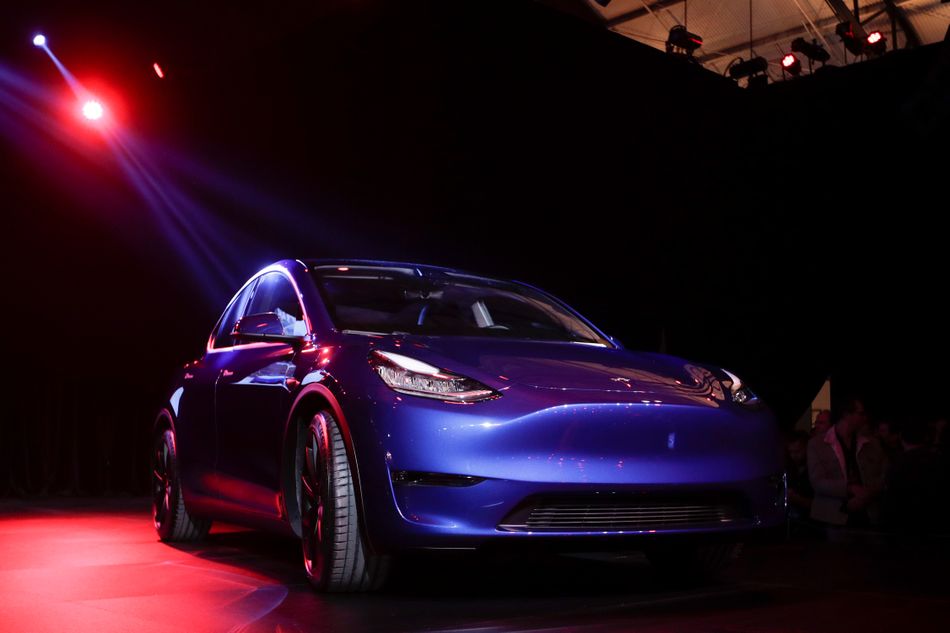Tesla’s Model Y is currently the hot electric compact SUV. But Ford, Nissan, Mercedes, and other automotive giants are coming for the crossover crown. The latest challenger: Cadillac’s first electric vehicle, the Lyriq.

The Tesla Model Y is unveiled at Tesla’s design studio, in Hawthorne, Calif.
Image: Jae C Hong/AP/Shutterstock
The Model Y is basically the SUV version of Tesla’s “budget” Model 3 and is already super popular. It’s about $50,000, which is roughly the average price of a non-electric small, luxury SUV.
In a recent Piplsay poll of more than 30,400 adults, almost a third of them said their next car will be an SUV. So it’s no surprise that electric crossovers are popping up everywhere. Here is a list of Model Y competitors coming in the next two years.
Announced Thursday evening, the first-ever electric Caddy is supposed to have a range of more than 300 miles. It also features a 33-inch LED screen in front of the driver, plus an AR heads-up display so they can keep their eyes on the road.
It’ll come with General Motors’ advanced driver system, Super Cruise, which allows drivers to let go of the wheel on the highway.

The first-ever electric Cadillac.
Image: Cadillac
Ford’s first 100-percent electric vehicle is a big one: a Mustang electric SUV. Revealed last year, the first limited-edition Mach-Es (including all the bells and whistles for $60,000) are supposed to arrive by the start of 2021. For the rest of us, the $44,000 version will be ready later next year with a 300-mile range. And don’t forget that Tesla-esque 15.5-inch touchscreen.

The all-electric Mustang Mach-E.
Image: Ford
The Ocean made a splash at CES 2020 even though it’s not expected to charge into the EV scene until 2022. But its waitlist is filling up, probably because it starts at $37,499 and has a range of 300 miles.
A few other features: a solar roof, recycled materials throughout, and “California mode” that lets you roll down all the windows with the press of a button.

The Ocean EV has an eco-friendly image to uphold.
Image: fisker
Mercedes’ first electric EV was announced back in 2018, but isn’t scheduled to arrive until later this year. It will offer a range of 280 miles and hit a max speed of 110 mph. The MBUX control system uses AI and voice recognition to play music, change the climate settings, and more.
That Mercedes logo doesn’t come cheap, however. The EQC will start at just under $70,000

The 2020 Mercedes EQC.
Image: Richard Drew / AP / Shutterstock
The smaller, more practical Nissan Leaf has been around for a decade. In 2021, Nissan will dip its toes into the luxury EV market. For around $40,000, the price of a maxed-out Leaf, the Ariya will feature two 12-inch touchscreens and haptic controls in the wood paneling.
Nissan’s first electric SUV will have a range of 300 miles. That’s about all we know about the Ariya until the company reveals more.

The Nissan Ariya is coming to the U.S.
Image: nissan
Chinese EV company Byton is mostly known for its massive 48-inch windshield screen, which spans the entire dashboard and includes gesture control. Sadly, because of COVID-19, its M-Byte will probably be released six months after its initial 2021 launch date.
The SUV will start at $45,000 and have a range of 200 miles. With its high-tech interior perfect for streaming movies and TV shows, features that could one day let the car drive itself, and lower price tag, it might stand a chance against the Model Y.

The Byton M-Byte grabbing a bite of energy.
Image: byton
Mazda’s first electric vehicle isn’t likely to be available for SUV-hungry Americans. But that might be OK since the car only gets 124 miles on a single charge.The MX-30 will come out in Japan and Europe in 2021.

Sadly, this one isn’t likely to make it to the U.S.
Image: mazda
Like Tesla, Rivian is trying to make it as an American EV startup. One of its first vehicles: a full-sized SUV that’s a bit more rugged than the Model Y. It’s capable of towing up to 7,700 pounds (more than double the Model Y), has built-in spaces for surfboards, kayaks, and skis, and has a protective underbody for rough roads.
The R1S will start at $69,000, with the top model getting 400 miles on a charge.

This is the Rivian SUV, but there’s also an electric pickup truck coming.
Image: Michael Brochstein / SOPA Images / Shutterstock
9. Volkswagen ID.4
Volkswagen revealed the ID.4 earlier this year as part of its growing electric lineup.
It’s the first in the ID series to be available to U.S. drivers, so naturally it’s a small SUV. An electric station wagon, sedan, and van are also in the works. The ID.4 will also come out in China and Europe.

The VW ID.4 is still camouflaged.
Image: volkswagen
Volvo unveiled its first electric SUV in 2019, which should be shipped to customers later this year. Pricing will be around $48,000 after federal tax incentives. It’s basically an electric version of Volvo’s existing XC40, and has a 200-mile range.

The Volvo XC40 Recharge is the first of many electric Volvos in the coming years.
Image: volvo
11. Porsche Macan EV
The all-electric version of the SUV isn’t supposed to even start production until the end of 2022, but if Porsche’s Taycan electric sports car is any indication, this version will take on Tesla’s Model Y head-on.
A Porsche spokesperson said it was too early to share photos or even renderings of what the car will look like.
